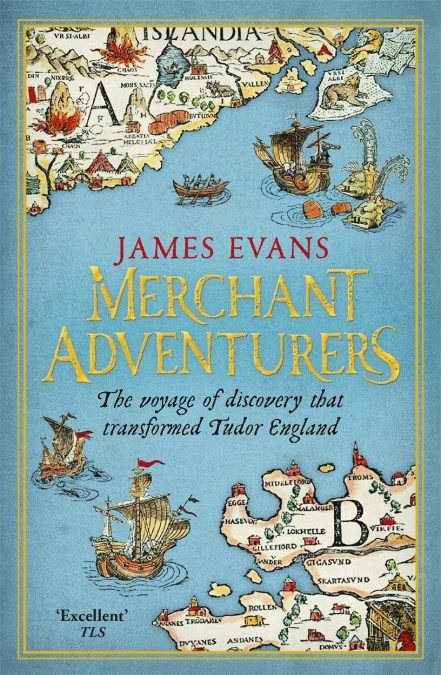A Tudor voyage of exploration – an extraordinary story of daring, discovery, tragedy and pioneering achievement.
In the spring of 1553 three ships sailed north-east from London into uncharted waters. The scale of their ambition was breathtaking. Drawing on the latest navigational science and the new spirit of enterprise and discovery sweeping the Tudor capital, they sought a northern passage to Asia and its riches.
The success of the expedition depended on its two leaders: Sir Hugh Willoughby, a brave gentleman soldier, and Richard Chancellor, a brilliant young scientist and practical man of the sea. When their ships became separated in a storm, each had to fend for himself. Their fates were sharply divided. One returned to England, to recount extraordinary tales of the imperial court of Tsar Ivan the Terrible. The tragic, mysterious story of the other two ships has to be pieced together through the surviving captain’s log book, after he and his crew became lost and trapped by the advancing Arctic winter.
This long-neglected endeavour was one of the boldest in British history, and its impact was profound. Although the ‘merchant adventurers’ failed to reach China as they had hoped, their achievements would lay the foundations for England’s expansion on a global stage. As James Evans’ vivid account shows, their voyage also makes for a gripping story of daring, discovery, tragedy and adventure.
In the spring of 1553 three ships sailed north-east from London into uncharted waters. The scale of their ambition was breathtaking. Drawing on the latest navigational science and the new spirit of enterprise and discovery sweeping the Tudor capital, they sought a northern passage to Asia and its riches.
The success of the expedition depended on its two leaders: Sir Hugh Willoughby, a brave gentleman soldier, and Richard Chancellor, a brilliant young scientist and practical man of the sea. When their ships became separated in a storm, each had to fend for himself. Their fates were sharply divided. One returned to England, to recount extraordinary tales of the imperial court of Tsar Ivan the Terrible. The tragic, mysterious story of the other two ships has to be pieced together through the surviving captain’s log book, after he and his crew became lost and trapped by the advancing Arctic winter.
This long-neglected endeavour was one of the boldest in British history, and its impact was profound. Although the ‘merchant adventurers’ failed to reach China as they had hoped, their achievements would lay the foundations for England’s expansion on a global stage. As James Evans’ vivid account shows, their voyage also makes for a gripping story of daring, discovery, tragedy and adventure.
Newsletter Signup
By clicking ‘Sign Up,’ I acknowledge that I have read and agree to Hachette Book Group’s Privacy Policy and Terms of Use
Reviews
This is the fascinating story of a forgotten few whose deeds had an important long-term impact on Britain's history
A fascinating insight into the minds of the merchant adventurers who laid the foundations for the British Empire, and much of our politics, for the next 400 years.
It is a heroic and tragic tale that for all the commercial and political agents at work remains, above all, a story of courage and endeavour. Evans is alert to the complexities of early modern diplomacy and cultural encounter, and the description of the survivors' experiences in Russia complements well the treatment of what they endured at sea
The book's strength is in showing the extent to which the institutional structure of the joint stock company that emerged from the ill-fated voyage as the Muscovy Company was a model that was replicated to form successful ventures in British trade and imperial outreach for the next two centuries
Looking for a short-cut sea route, in 1553 they commissioned Sir Hugh Willoughby and Richard Chancellor to voyage in search of a northeast passage through the Arctic to Asia. Their venture was, says Evans, one of the boldest in English history as a significant turning point in English economic and cultural development. It's also a good story, well told
Essentially this should be a tale of a spectacular failure, yet Evans' enthusiasm in relating the achievements of their 1553 voyage is infectious ... James Evans' excellent book reminds us that even the most ill-fated attempts broke new ground. These first, tentative missions eventually allowed for the eastern side of the map of the world to be inked in
James Evans offers an account of an extraordinary 1553 voyage full of daring, discovery, tragedy and pioneering achievement. The Chalk Farm author lifts the lid on how a Britain with little maritime experience came to rule the waves through the efforts of historic pioneers like Sebastian Cabot, Sir Hugh Willoughby and Richard Chancellor
Meticulously researched ... Evans's short, exciting chapters describe the voyage and 16th-century life, technology and politics in glorious detail
Entertaining and meticulously researched ... Merchant Adventurers is much more than a reconstruction of one of the most fascinating voyages of the Tudor age. The author places the expedition in the wider context of global exploration, mercantile expansion and the establishment of the first joint-stock company. Indeed he argues that the 1553 expedition anticipated the dawn of a new era, one that would see the formation of the East India Company and England's fledgling empire
Evans combines gripping adventure stories with an exploration of the roots of the British empire and national consciousness
This is an extraordinary tale of a voyage of discovery every bit as epoch-making as those of Spain and Portugal ... A richly detailed account that is a pleasure to read

